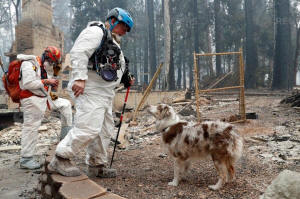|
Cadaver dogs lead grim search for victims
in California fire
 Send a link to a friend
Send a link to a friend
 [November 15, 2018]
By Terray Sylvester [November 15, 2018]
By Terray Sylvester
PARADISE, Calif. (Reuters) - A shaggy male
Australian shepherd named IC darted nervously through the charred
remnants of a house in Paradise, California, sniffing for victims of the
deadliest blaze in the state's history.
"He’s getting an overload of scent," said his handler, Trish Moutard, a
volunteer with CARDA, the California Animal Rescue Dog Society, while
searching properties on Forest Glen Road in Paradise. "It’s a new
experience for him."
IC was among several cadaver dogs brought in to look for victims of the
Camp Fire, which has so far killed 48 people and burned 135,000 acres
(55,000 hectares). Fire fighters have said it was only 35 percent
contained. Authorities said they have not accounted for nearly 230
people.
On Wednesday, a National Guard contingent was sent to Paradise, a town
of about 27,000 in the Sierra foothills that has been largely reduced to
ashes, to seek and identify human remains. They will join the cadaver
dogs, coroner-led recovery teams and forensic anthropologists searching
the ghostly landscape.

IC appeared agitated as he was instructed to sniff inside a car and a
pile of rubble from the destroyed house - a brick chimney and burned
trees the only things standing on the property.
Moutard said that she and IC had previously only worked house fires and
the dog was overwhelmed by the size of the search area and multitude of
scents from what was left of house after house.
She said her method was to look for places where people may be trapped
by fire, such as front and back doorways, or where they might take
shelter, such as a bathtub.
"I generally try to look at what’s going to be the catch point for
someone in a home," she said.
She stays alert for obvious body parts that would survive fire, “skulls
often,” but also looks for imprints of bodies, a discolored area in the
shape of a human, that may be the most obvious remnant.
[to top of second column]
|

Trish Moutard (C), of Sacramento, searches for human remains with
her cadaver dog, I.C., in a house destroyed by the Camp Fire in
Paradise, California, U.S., November 14, 2018. REUTERS/Terray
Sylvester

“In a fire like this it may just simply appear as an outline,” she
said. “What may be left is just literally the outline of a person.”
A husband-wife team, Karen and Larry Atkinson, worked their way
through devastated properties near Eden Roc Drive in Paradise with
their dog Echo, an English lab.
Echo dashed ahead, nose to the ground, and then returned to Karen,
who would point the dog toward the next place to be searched.
She periodically shook talcum powder from a bottle to test the
direction of the wind and make sure the dog searched the downwind
side of each location so it would be easier to pick up scents.
As they searched, the Atkinsons stayed alert for hazards: downed
power lines, holes left by burned roots, and dangling tree branches,
which they called “widow makers.”
Larry Atkinson said the search was painstaking because Echo was
working through many scents to single out human remains.
"There’s a lot of scent everywhere, and it’s hard to nail down," he
said.
(Reporting by Terray Sylvester; Editing by Dina Kyriakidou, Toni
Reinhold)
[© 2018 Thomson Reuters. All rights
reserved.]
Copyright 2018 Reuters. All rights reserved. This material may not be published,
broadcast, rewritten or redistributed.
Thompson Reuters is solely responsible for this content.
 |